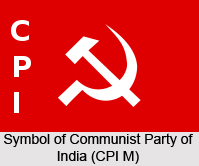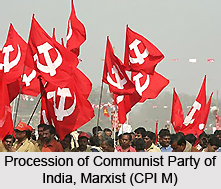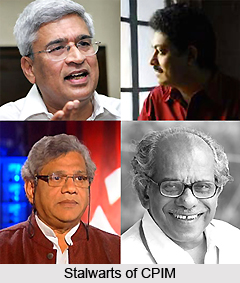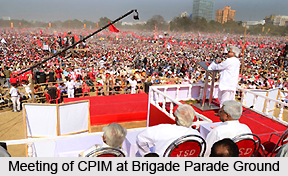 Communist Party of India (Marxist) is an Indian political party, which has its strong presence in the states of Kerala, West Bengal and Tripura. The party came forth from a split from the Communist Party of India in 1964. As of 2004, CPI(M) claimed to have 8,677,63 members.
Communist Party of India (Marxist) is an Indian political party, which has its strong presence in the states of Kerala, West Bengal and Tripura. The party came forth from a split from the Communist Party of India in 1964. As of 2004, CPI(M) claimed to have 8,677,63 members.
But the Communist Party of India went through a rift within the party during 1962. Sino-Indian War is considered the cause behind this. Because of the war, a section of the Indian communists plunked for the position of the Indian government and others affirmed it as a conflict between a socialist and a capitalist state, and thus took a pro-Chinese position. The CPI divided into three sections of internationalists, centrists, and nationalists. Prominent leaders like S.A. Dange, A. K. Gopalan, and E. M. S. Namboodiripad were in the nationalist faction; B. T. Ranadive, Sundarayya, P. C. Joshi, Basavapunniah, Jyoti Basu, and Harkishan Singh Surjeet were amongst those who backed up China; Ajoy Ghosh was in the centrist faction. Communist leaders from Bengal supported China and the rest supported India. After the death of the CPI general secretary, Ajoy Ghosh in 1962, S.A. Dange was established as the party chairman (a new position) and E.M.S. Namboodiripad as general secretary. Through this, CPI attempted to mellow down the conflict within the party. The rightist fraction of the party was represented by S.A. Dange and E.M.S. representing the leftist fraction.
These kind of ideological divergences contributed to the split in the party in 1964. The Communist Party of India and the Communist Party of India (Marxist) separated out. It would be wrong to identify the Sino-Indo war as the only reason behind this split up. This split-up happened between leftists vs rightists and not the internationalists vs nationalists. The presence of nationalists in the Communist Party of India (Marxist) like A. K. Gopalan, and E.M.S. Namboodiripad, and internationalists like P. Sundarayya, Jyoti Basu, and Harkishan Singh Surjeet proves this fact.
Communist Party of India (Marxist) was established in a politically unfriendly climate.At the time when they were holding Calcuta Congress, large sections of its leaders and cadres were jailed without trial. During the year 1965 a new wave of arrests of CPI(M) cadres blew out in West Bengal, as the party launched agitations against the rise in fares in Calcutta Tramways and also against the then dominating food crisis. State-wide general strikes and hartals took place on August 5, 1965, March 10-11, 1966 and April 6, 1966. General strike held on March 1966 resulted in several deaths and confrontations with police forces. This wave spread to other states like, Bihar and Kerala.
The Central Committee of CPI(M) organised its first meeting on June 12-19, 1966. This meeting was supposed to be held in Tripura during the last days of 1964. But due to numerous arrests it was postponed. Tactics for electoral alliances was discussed in the meeting. They decided to `form a broad electoral alliance with all non-reactionary opposition parties in West Bengal, except Jan Sangh and Swatantra Party`. But this decision earned flak from the Communist Party of China, the Party of Labour of Albania, the Communist Party of New Zealand and the radicals inside the party itself. In the 1967 Lok Sabha elections CPI(M) nominated 59 candidates of which 19 were selected. They raised as a major party in Kerala and West Bengal in the state legistative elections.
 At this juncture some sectors within the party were frightened to experience the changing parliamentary focus of the party leadership. Two separate inner protester tendencies in West Bengal emerged. Both were named as supporting the Chinese line. A peasant uprising broke out in Naxalbari, northern West Bengal in 1967. Hardline district-level CPI(M) leaders like Charu Majumdar and Kanu Sanyal headed the insurgency. The insurgency worked as a spark in order to conflagrate the Indian revolution. The Naxalbari movement hailed by the Communist Party of China, was set about to cause an abrupt break in CPI(M)-CPC relations. The West Bengal government, of which CPI(M) was a major partner, violently repressed the Naxalbari movement. Within the party, the conservatives rallied around an All India Coordination Committee of Communist Revolutionaries.
At this juncture some sectors within the party were frightened to experience the changing parliamentary focus of the party leadership. Two separate inner protester tendencies in West Bengal emerged. Both were named as supporting the Chinese line. A peasant uprising broke out in Naxalbari, northern West Bengal in 1967. Hardline district-level CPI(M) leaders like Charu Majumdar and Kanu Sanyal headed the insurgency. The insurgency worked as a spark in order to conflagrate the Indian revolution. The Naxalbari movement hailed by the Communist Party of China, was set about to cause an abrupt break in CPI(M)-CPC relations. The West Bengal government, of which CPI(M) was a major partner, violently repressed the Naxalbari movement. Within the party, the conservatives rallied around an All India Coordination Committee of Communist Revolutionaries.
The AICCCR separated themselves from CPI(M) following the 1968 Burdwan plenum of CPI(M). This separation affected the entire country. Another revolt took place in Andhra Pradesh. There were many ex-servicemen from the Telangana armed struggle, who mustered up against the central party leadership. T. Nagi Reddy, a member of the state legislative assembly was the main leader of the radical tendency. A press statement was published by the radical tendency leaders in 1968 adumbrating the criticism of the development of CPI(M). Prominent leaders like T. Nagi Reddy, D.V. Rao, Kolla Venkaiah and Chandra Pulla Reddy had signed the press statement. About 50% of the party cadres in Andhra Pradesh left the party. Under the leadership of T. Nagi Reddy, they formed the Andhra Pradesh Coordination Committee of Communist Revolutionaries.
In 1967, the central government dismissed the West Bengal United Front government. The 8th Party Congress of CPI(M) was held in Cochin, Kerala from December 23-29, 1968. However with the outside support of the Indian National Congress a coalition government led by CPI leader C. Achutha Menon was formed. Fresh election was held in West Bengal in 1969. The Communist Party of India (Marxist) won 80 seats where they had contested for 97 seats. And it became the largest in the West Bengal legislative. Ajoy Mukherjee was brought back as Chief Minister of the state with active support from CPI and the Bangla Congress. CPI, Bangla Congress and the Indian National Congress came under a pact against CPI(M) and as a result Ajoy Mukherjee resigned in 1970. Fresh election took place in Kerala, in 1970, after which Achutha Menon formed a new ministry, including ministers from the Indian National Congress.
The CPI(M) cadres following the 1964 split had remained active with the All India Trade Union Congress. In the backdrop of confrontations in West Bengal and Kerala, the All India Trade Union Congress also experienced a split within the organisation. The 1971 general election in Lok Sabha took place, in the backdrop of the 1971 Bangladesh War and the emerging role of Indira Gandhi as an exponent national leader. CPI(M) won 25 seats of which 20 came from West Bengal (including Somnath Chatterjee, elected from Burdwan), 2 from Kerala (including A.K. Gopalan, elected from Trichur), 2 from Tripura (Biren Dutta and Dasarath Deb) and 1 from Andhra Pradesh.
 State legislative elections were also held in three states: West Bengal, Tamil Nadu and Orissa in the same year. In West Bengal CPI(M) had 241 candidates, winning 113 seats; to sum up, the party mustered 4,241,557 votes (32.86% of the state-wide vote); in Tamil Nadu CPI(M) contested 37 seats, but drew blank. The party received 2,592,98 total votes (1.65% of the state-wide vote). In Orissa the party contested 11 seats, and won two. The CPI(M) vote in the state was 52,785 (1.2% of the state-wide vote). Again in 1977, the Communist Party of India (Marxist) earned absolute majority in the Legislative Assembly of West Bengal; the result of which Jyoti Basu became the chief minister of West Bengal. Since 1977, CPI(M) has held absolute majority in the West Bengal government unremittingly.
State legislative elections were also held in three states: West Bengal, Tamil Nadu and Orissa in the same year. In West Bengal CPI(M) had 241 candidates, winning 113 seats; to sum up, the party mustered 4,241,557 votes (32.86% of the state-wide vote); in Tamil Nadu CPI(M) contested 37 seats, but drew blank. The party received 2,592,98 total votes (1.65% of the state-wide vote). In Orissa the party contested 11 seats, and won two. The CPI(M) vote in the state was 52,785 (1.2% of the state-wide vote). Again in 1977, the Communist Party of India (Marxist) earned absolute majority in the Legislative Assembly of West Bengal; the result of which Jyoti Basu became the chief minister of West Bengal. Since 1977, CPI(M) has held absolute majority in the West Bengal government unremittingly.
In last parliamentary election of 2004, the Communist Party of India (Marxist) received 5.66% votes. On an average it won 42.31% seats. Without becoming a part of it, it supports the new Indian National Congress-led United Progressive Alliance government. The Communist Party of India (Marxist) participates in the Left Front in West Bengal and Tripura; in Kerala the party is part of the Left Democratic Front; in Tamil Nadu it is part of the Progressive Democratic Alliance. Prakash Karat is the current General Secretary of CPI(M). Somnath Chatterjee, is the the CPI(M) MP of Lok Sabha (2004). The 18th party congress of CPI(M) was held in Delhi from April 6-11, 2005. A Central Committee with 85 members was elected. A 17-member Politburo elected by the Central Committee comprised- Harkishan Singh Surjeet; Jyoti Basu; V.S. Achuthanandan; Prakash Karat; Sitaram Yechury; S. Ramachandran Pillai; R. Umanath; Anil Biswas (died on March 26, 2006); Biman Bose; Manik Sarkar; Pinarai Vijayan; M.K. Pandhe; Buddhadeb Bhattacharya; Chittabrata Mazumdar (died on February 20, 2007); K. Varadarajan; B.V. Raghavulu; Brinda Karat.
Democratic Youth Federation of India; Students Federation of India; Centre of Indian Trade Unions class organisation; All India Kisan Sabha peasants` organization; All India Agricultural Workers Union; All India Democratic Women`s Association; Bank Employees Federation of India; All India Lawyers Union are the principal mass organisations of the CPI(M). The Ganamukti Parishad in Tripura is also a major mass organisation amongst the tribal people of the state. The Adivasi Kshema Samithi in Kerala is also a tribal organisation controlled by CPI(M). Aart from this,on the cultural front, there are 12 major organisations led by the Communist Party of India (Marxist).
`People`s Democracy` (English) and `Lok Lehar` (Hindi) are two weekly newspapers published from the centre. `The Marxist` published quarterly in English is the central theoretical organ of the party. Other daily newpapers are, Ganashakti (from West Bengal in Bengali); Desabhimani (Kerala, Malayalam); Daily Desher Katha (Tripura, Bengali); Theekathir (Tamil Nadu, Tamil); Prajashakti (Andhra Pradesh, Telugu). Abshar (West Bengal, Urdu); Swadhintha (West Bengal, Hindi); Desh Hiteshi (Bengali); Janashakthi (Karnataka, Kannada); Jeevan Marg (Maharashtra, Marathi); Samyabadi (Orissa, Oriya); Deshabhimani Vaarika (Kerala, Malayalam); Ganashakti (Assamese, Assam) are the weeklies. Lok Jatan (Madhya Pradesh, Hindi); Lok Samvad (Uttar Pradesh, Hindi); Sarfarosh Chintan (Gujarat, Gujarati) are the fortnightlies. Shabtaab (Urdu); Yeh Naya Raste (Jammu & Kashmir, Urdu); Lok Lahar (Punjabi); Nandan (Bengali); Marxist (Tamil language) are the monthlies.
 Some theoritical publications are Marxist (in English); Marksbadi Path (in Bengali); Chinta (in Malayalam); Marxist (in Telugu). Leftword Publication; CPI(M) Publication; National Book Agency (West Bengal); Chinta Publication (Kerala); Prajasakti Book House (Andhra Pradesh); Deshabhimani Book House (Kerala); Natun Sahitya Parishad (Assam) are the publication houses from CPI(M).
Some theoritical publications are Marxist (in English); Marksbadi Path (in Bengali); Chinta (in Malayalam); Marxist (in Telugu). Leftword Publication; CPI(M) Publication; National Book Agency (West Bengal); Chinta Publication (Kerala); Prajasakti Book House (Andhra Pradesh); Deshabhimani Book House (Kerala); Natun Sahitya Parishad (Assam) are the publication houses from CPI(M).
As a result of divides from CPI(M) a large number of parties have formed such as, Communist Party of India (Marxist-Leninist), Marxist Communist Party of India, Marxist Coordination Committee in Jharkhand, Janathipathiya Samrakshana Samithy, Communist Marxist Party and BTR-EMS-AKG Janakeeya Vedi in Kerala, Party of Democratic Socialism in West Bengal, Janganotantrik Morcha in Tripura, the Ram Pasla group in Punjab, Orissa Communist Party in Orissa, etc.






